
Chemical Product and Process Modeling
Scope & Guideline
Advancing the art of chemical engineering through innovative modeling.
Introduction
Aims and Scopes
- Process Modeling and Simulation:
The journal emphasizes the development and application of mathematical models and computational simulations to analyze and optimize chemical processes, including reactor design, heat exchangers, and separation processes. - Energy Efficiency and Sustainability:
Research aimed at improving energy efficiency and sustainability in chemical processes is a core focus. This includes studies on energy consumption reduction, waste minimization, and the utilization of renewable resources. - Machine Learning and Artificial Intelligence Applications:
The integration of machine learning and AI techniques in modeling chemical processes and optimizing operational parameters is increasingly featured, showcasing innovative methodologies to enhance predictive capabilities. - Thermodynamic and Kinetic Analysis:
The journal publishes work that explores thermodynamic properties and kinetic behaviors of chemical reactions, particularly in the context of biomass gasification, catalysis, and material synthesis. - Environmental Impact Assessment:
Research examining the environmental implications of chemical processes, including pollutant removal and resource recovery, is a significant area of interest, highlighting the journal's commitment to sustainable practices.
Trending and Emerging
- Integration of Machine Learning in Chemical Engineering:
An increasing number of studies are utilizing machine learning algorithms to enhance process modeling, predictive maintenance, and optimization, indicating a shift towards data-driven approaches in chemical process engineering. - Focus on Renewable and Alternative Energy Sources:
Research on the development and optimization of processes related to renewable energy sources, such as biofuels and hydrogen production from biomass, is gaining significant attention as sustainability becomes a critical focus. - Advanced Material Synthesis and Characterization:
There is a growing interest in the modeling and simulation of advanced materials, particularly nanomaterials and their applications in chemical processes, reflecting a trend towards innovative material design. - Environmental Remediation and Waste Management:
Emerging themes include the optimization of processes aimed at environmental remediation, such as wastewater treatment and pollutant removal, showcasing a commitment to addressing environmental challenges. - Hybrid and Multi-Phase Systems:
Research involving hybrid systems that integrate multiple phases (gas, liquid, solid) and their modeling is on the rise, driven by the complexity and interconnectivity of modern chemical processes.
Declining or Waning
- Traditional Chemical Process Optimization:
There has been a noticeable decrease in publications focusing solely on conventional optimization techniques without the integration of modern computational tools or AI methodologies. - Basic Thermodynamic Studies:
Research centered on fundamental thermodynamic principles without practical applications or advanced modeling techniques appears less frequently, as more complex and applied studies gain traction. - Empirical Experimental Studies:
The journal is witnessing a decline in studies that are purely empirical or experimental without a strong modeling or computational component, as the trend shifts towards integrated approaches. - Single-Domain Studies:
Research that focuses exclusively on a single aspect of chemical engineering (e.g., only thermodynamics or only kinetics) is becoming less common, with a preference for interdisciplinary studies that encompass multiple domains.
Similar Journals
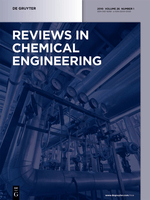
REVIEWS IN CHEMICAL ENGINEERING
Connecting Theory with Real-world Applications.REVIEWS IN CHEMICAL ENGINEERING, published by Walter de Gruyter GmbH, is a premier journal that delivers cutting-edge insights and comprehensive reviews in the field of chemical engineering. Established as an eminent resource since 1982, this journal is committed to advancing knowledge and fostering innovation in various domains of chemical engineering, including process design, materials, and environmental considerations. With an impressive Q1 ranking in the 2023 Scopus category for Chemical Engineering and a commendable 20th position out of 273 journals, it is recognized for its rigorous peer-review process and high-impact contributions. Although it operates under a subscription model, the journal remains a vital platform for researchers and professionals aiming to stay at the forefront of technological advancements and scholarly discourse in chemical engineering. With a focus on interdisciplinary applications and real-world relevance, REVIEWS IN CHEMICAL ENGINEERING is an indispensable resource for academics, industry professionals, and students dedicated to excellence in this field.
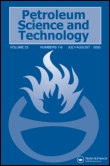
PETROLEUM SCIENCE AND TECHNOLOGY
Elevating knowledge in petroleum engineering and technology.PETROLEUM SCIENCE AND TECHNOLOGY, published by Taylor & Francis Inc, is a pivotal journal dedicated to advancing the multidisciplinary field of petroleum engineering and related technologies. With an ISSN of 1091-6466 and an E-ISSN of 1532-2459, this journal serves as a vital platform for disseminating research in areas ranging from geotechnical engineering to energy technology. As of 2023, it is recognized in the Q3 quartile across several categories, including Chemical Engineering and Fuel Technology, signifying its respectable standing within the academic community. With a convergence timeline from 1997 to 2024, the journal continuously addresses crucial issues in the energy sector, making it essential reading for researchers, industry professionals, and policy-makers alike. Although not an open access journal, its rigorous peer-reviewed articles contribute significantly to the advancement of knowledge and innovation within these fields, reflecting the journal's commitment to promoting scientific understanding and practical applications.
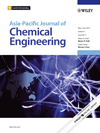
Asia-Pacific Journal of Chemical Engineering
Fostering Interdisciplinary Research for a Sustainable Future.The Asia-Pacific Journal of Chemical Engineering, published by WILEY, serves as a vital forum for the dissemination of innovative research in the interdisciplinary domains of chemical engineering, renewable energy, sustainability, and waste management. Established in 2006, this esteemed journal has achieved a notable impact factor that reflects its commitment to advancing knowledge and practices within the chemical engineering community. With its Q3 category rankings across various fields, including Chemical Engineering (Miscellaneous), Renewable Energy, Sustainability and the Environment, and Waste Management and Disposal, the journal holds a significant position among its peers, assuring readers of quality and relevance in published content. Although it does not offer Open Access options, the Asia-Pacific Journal of Chemical Engineering remains an essential resource for researchers, professionals, and students aiming to stay at the forefront of innovations affecting the Asia-Pacific region and beyond. The journal's broad scope covers diverse topics, making it an integral part of the academic landscape from 2006 to 2024.

ACS ES&T Engineering
Connecting Scholars to Shape the Future of Engineering and Environmental Practices.ACS ES&T Engineering, published by the American Chemical Society, stands as a leading journal in the realm of Chemical Engineering, Environmental Chemistry, and related fields, with a notable Impact Factor indicative of its scholarly influence. Emerging from 2021 with a vision to address contemporary challenges in engineering and environmental health, this Journal not only covers critical studies in Chemical Engineering but also excels in areas such as Process Chemistry and Technology, aligning with its Q1 status across several categories in 2023. With exceptional rankings in Scopus, including a percentile rank in the 90th for Chemical Health and Safety, it offers a significant platform for researchers, educators, and practitioners to disseminate innovative research and practices. Although the journal maintains a subscription model, its commitment to rigorous peer review and high-quality content ensures that readers gain access to pivotal findings essential for advancing knowledge and practice in a rapidly evolving scientific landscape. For those dedicated to tackling global engineering challenges, ACS ES&T Engineering is an invaluable resource.
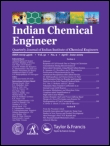
Indian Chemical Engineer
Transforming Ideas into Chemical Engineering Solutions.Indian Chemical Engineer, published by Taylor & Francis Ltd, stands as a reputable journal in the field of chemical engineering, encompassing a wide range of topics pertinent to both academia and industry. With an ISSN of 0019-4506 and an E-ISSN of 0975-007X, this journal has been a key resource for researchers and professionals since its inception in 1992, undergoing a significant evolution from 2009 to 2024. Currently ranked in the Q3 category of chemical engineering (miscellaneous) in 2023, it reflects a dedicated commitment to disseminating innovative research and insights within the discipline. The journal is indexed in Scopus, achieving a rank of 148 out of 273, which denotes its growing influence in the field with a 45th percentile placement. Although currently not an open-access publication, it offers valuable content that contributes extensively to the advancement of chemical engineering research and education. Researchers, professionals, and students alike are encouraged to engage with this publication to stay at the forefront of industry advancements and academic discussions.

Interfacial Phenomena and Heat Transfer
Innovating Solutions for Fluid Flow and Chemical ProcessesInterfacial Phenomena and Heat Transfer is a leading academic journal published by BEGELL HOUSE INC that has rapidly established itself as an essential resource for scholars and industry experts in the fields of engineering, fluid flow, and chemical processes. With an ISSN of 2169-2785 and E-ISSN 2167-857X, this journal focuses on the critical interdisciplinary aspects of heat transfer and interfacial phenomena, offering insights that span across mechanical engineering, chemical engineering, and physical sciences. Despite its relatively recent inception in 2017, it has garnered respectable recognition, with a 2023 Scopus rank placing it in the Q3 category within the disciplines of Engineering (miscellaneous) and Fluid Flow and Transfer Processes, making it a pertinent publication for those interested in cutting-edge research. As researchers and professionals navigate the complexities of interfacial dynamics, Interfacial Phenomena and Heat Transfer serves as a pivotal platform, publishing high-quality, peer-reviewed articles that aim to advance knowledge and stimulate further investigation in this increasingly vital domain.

CT&F-Ciencia Tecnologia y Futuro
Advancing knowledge in chemical engineering and energy.CT&F-Ciencia Tecnologia y Futuro, a distinguished open-access journal published by ECOPETROL SA, serves as a vital platform for the dissemination of innovative research and advancements in the fields of chemical engineering, energy, fuel technology, and the broader disciplines within the geosciences. Established in 1996 and operating continuously until 2023, this bilingual journal aims to foster collaboration and knowledge exchange among researchers, professionals, and students in Colombia and beyond. With an increasing emphasis on sustainability and renewable energy, CT&F aligns with contemporary academic priorities and societal challenges. Although currently ranked in the Q4 category across multiple disciplines, the journal remains committed to enhancing its impact and accessibility, providing researchers with valuable insights and a significant forum to share their findings, all under the auspices of open-access since 2009. Explore a wealth of research as you contribute to the ongoing dialogue shaping the future of science and technology.
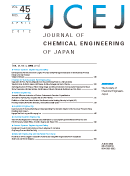
JOURNAL OF CHEMICAL ENGINEERING OF JAPAN
Empowering Emerging Scholars in Chemical ResearchJOURNAL OF CHEMICAL ENGINEERING OF JAPAN is a distinguished academic publication in the field of chemical engineering and chemistry, published by Taylor & Francis Ltd. With its ISSN 0021-9592 and E-ISSN 1881-1299, this journal has been a vital resource for researchers and practitioners since its inception in 1968 and continues to provide essential insights and advancements through 2024. The journal operates under an Open Access model as of 2023, promoting wider dissemination of research findings and encouraging collaboration within the global scientific community. Currently categorized in the Q4 quartile for both Chemical Engineering and Chemistry (miscellaneous) in 2023, it ranks within the lower percentiles of its respective fields, offering a platform for emerging scholars to publish their work and gain visibility. As part of Japan's academic landscape, it addresses numerous aspects of chemical engineering, fostering innovation and technical development that contribute to the industry's growth. Engaging with this journal is paramount for those looking to stay informed on the latest research trends and applications in chemical processes.
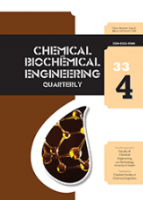
CHEMICAL AND BIOCHEMICAL ENGINEERING QUARTERLY
Exploring the Frontiers of Chemical and Biochemical ResearchCHEMICAL AND BIOCHEMICAL ENGINEERING QUARTERLY, published by the Croatian Society of Chemical Engineering Technology, is a distinguished open-access journal that has been providing a platform for the dissemination of innovative research since its inception in 1987. With a focus on the fields of biochemistry and chemical engineering, this quarterly journal addresses a wide array of topics, including process chemistry and technology, making significant contributions to both academia and industry. Despite its current positioning in the Q4 category for biochemistry and Q3 for miscellaneous chemistry and process chemistry in 2023, the journal continues to strive for greater impact, catering to researchers, professionals, and students alike. Its open-access model, in place since 2001, ensures that cutting-edge research is accessible to a broad audience, fostering collaboration and knowledge sharing within the scientific community. By promoting high-quality research and providing insights into the latest advancements, Chemical and Biochemical Engineering Quarterly remains an essential resource for those involved in the chemical and biochemical engineering disciplines.
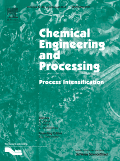
Chemical Engineering and Processing-Process Intensification
Exploring Efficiency in Chemical ProcessesChemical Engineering and Processing - Process Intensification is a leading journal published by Elsevier Science SA, specializing in the multifaceted domain of chemical engineering. With the ISSN 0255-2701 and E-ISSN 1873-3204, this journal stands as a beacon of knowledge, facilitating the dissemination of innovative research from 1984 onwards and continuing through 2024. Renowned for its rigorous peer-review process, it boasts a distinguished reputation, reflected in its top-tier rankings within several fields: Q1 in Chemical Engineering (Miscellaneous), Q2 in Chemistry, and Q1 in Industrial and Manufacturing Engineering. This journal focuses on the advancements in process intensification, which are crucial for optimizing efficiency and sustainability in chemical processes. Although access is not open, the journal serves as an essential resource for researchers, professionals, and students alike who seek to advance their understanding and contribute to the evolving landscape of chemical engineering and process technology. Join a community of innovators driving the future of process engineering through impactful and cutting-edge research.